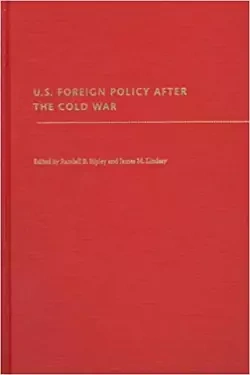
U.S. Foreign Policy After the Cold War
Pitt Series in Policy and Institutional Studies

- Book
- Foreign policy analyses written by CFR fellows and published by the trade presses, academic presses, or the Council on Foreign Relations Press.
More on:
The cold war came to a grinding halt during the astounding developments of 1989-1991.The Berlin Wall fell, Eastern European countries freed themselves from Soviet domination, and the Soviet Union itself disintegrated after witnessing a failed coup presumably aimed at restoring a communist dictatorship. Suddenly the "evil empire" was no more, and the raison d'etre for most post-World War II U.S. foreign policy vanished.What has happened to the content of U.S. foreign policy and to the bureaucracy responsible for making that policy in the years since those momentous events? Have there been significant changes? If not, why not? Have George Bush and Bill Clinton provided leadership designed to produce meaningful change?These are the crucial questions addressed in this timely volume of essays, a collaborative effort which began at a 1994 conference held in Columbus, Ohio, and sponsored by the Mershon Center at Ohio State University and the Midwest Consortium for International Security Studies. The authors of the individual chapters examine a wide variety of bureaucratic institutions and some major substantive policy areas. In a concluding chapter, the editors synthesize these findings to provide more general answers: There are signs of genuine change, they argue, but there is much more evidence to suggest that the United States is clinging to its old foreign policies and structures. They cite a lack of presidential leadership as one of the key elements in explaining why U.S. foreign policy has not adapted to a dramatically altered world.
More on:
 Online Store
Online Store